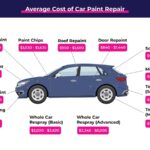Is this a scenario you know all too well? Your car is acting up again, and you’re staring down the barrel of a hefty repair bill. It might feel like a recurring theme, and the thought of constantly investing in an aging vehicle is wearing you down. The allure of a brand-new car is strong, but is it the wisest move in today’s economy? With both new and used car prices reaching unprecedented highs, many car owners are grappling with the crucial question: “Should I invest in repairing my current car, or is it time to trade it in for a new vehicle?”
The Rising Costs of Car Ownership
Car ownership comes with inevitable expenses, but recent market trends have amplified the financial strain. According to a 2020 Consumer Reports survey, the average annual repair and maintenance cost for a 5-year-old car is around $205, but this figure more than doubles to $430 for a 10-year-old vehicle. Unexpected major repairs can significantly inflate these costs. For example, a CarMD report from 2021 revealed that catalytic converter replacements or repairs—a sadly common issue due to theft—average around $1,383. While these figures are substantial, they must be weighed against the backdrop of escalating new and used car prices.
The average price for a new car loan reached $637 per month with a 70-month term, as reported by Edmunds. Used car payments are also hitting record levels, averaging $535 in early 2023. These figures highlight the significant financial commitment involved in purchasing any vehicle in the current market. Beyond the purchase price, new car ownership brings increased insurance premiums and registration fees compared to older vehicles, adding to the overall cost.
Arguments for Repairing Your Current Car
For many, especially those with budget constraints or a desire to wait for the market to stabilize, repairing the existing car presents a sensible path forward. Choosing to repair can extend the life of your vehicle, postponing the significant financial outlay of a car purchase in an inflated market.
Financial Prudence
Generally, repairing a car is almost always the more economical option compared to buying a new one. Even substantial repairs like an engine or transmission rebuild typically range from approximately $1,200 to $5,000. While this is a considerable sum, it’s significantly less than the purchase price of a new vehicle. Thinking of that $3,000 to $5,000 repair bill as a down payment might seem appealing, but it’s crucial to remember the ongoing financial burden of monthly car payments, which can quickly accumulate over the loan term.
Avoiding Market Instability
The current automotive market is experiencing price volatility. Repairing your car allows you to avoid entering this unpredictable market and potentially wait for prices to normalize. This strategy can be particularly appealing if you believe that current high prices are temporary and will eventually decrease. By extending the life of your current vehicle, you gain the flexibility to purchase a new car when market conditions are more favorable.
Arguments for Buying a New Car
Despite the financial advantages of repairing, there are compelling reasons to consider buying a new car, particularly when dealing with an aging and unreliable vehicle. If you’re facing constant repairs and escalating maintenance costs, or if your car’s unreliability is causing stress and disruption, a new car can offer significant benefits.
Reliability and Peace of Mind
Older cars are inherently less predictable than new ones. The constant worry of breakdowns, missed appointments, or potential safety hazards due to vehicle malfunction can be emotionally draining. A new car provides peace of mind by eliminating these concerns, at least for the initial years of ownership. New car warranties, typically lasting around three years, cover most repairs, and major issues are less likely to occur in the first few years. Even opting for a certified pre-owned vehicle can offer a significant improvement in reliability compared to an older, higher-mileage car.
Enhanced Safety and Technology
New cars are significantly safer than older models due to advancements in vehicle engineering and safety technology. Modern vehicles incorporate stronger body structures, improved crumple zones, and advanced safety systems. Features like automatic emergency braking, lane departure warnings, blind-spot monitoring, and rearview cameras are increasingly standard, enhancing driver and passenger safety. These safety advancements are a significant advantage of new cars, providing a level of protection not available in older vehicles.
Factors to Consider When Deciding
The decision to repair or replace your car is highly personal and depends on a combination of factors. Carefully consider the following aspects to make an informed choice:
- Repair Costs: Obtain a detailed estimate for the necessary repairs. Compare this cost to the potential down payment and ongoing expenses of a new or used car.
- Vehicle Age and Condition: Assess the overall condition of your car. Consider its age, mileage, and history of repairs. Older, high-mileage vehicles are generally more prone to breakdowns and require more frequent maintenance.
- Reliability Needs: Evaluate your need for a reliable vehicle. If you depend heavily on your car for commuting, family transportation, or work, reliability becomes a paramount concern.
- Budget and Financial Situation: Analyze your current financial situation and budget. Determine what you can comfortably afford in terms of car payments, insurance, and other ownership costs.
Proactive Car Maintenance: Extending Your Car’s Life
Regardless of whether you choose to repair or replace your car now, proactive maintenance is crucial for extending the life of any vehicle and minimizing unexpected repair costs.
- Regular Servicing: Adhere to the recommended service intervals outlined in your owner’s manual. Regular maintenance, including oil changes, fluid checks, and tire rotations, can prevent minor issues from escalating into major repairs.
- Trusted Mechanic: Establish a relationship with a reliable local mechanic. Independent mechanics often offer more affordable rates than dealership service departments for routine maintenance and repairs.
- Online Resources: Utilize online forums and message boards specific to your car’s make and model. These platforms can provide valuable insights into common problems, maintenance tips, and potential future issues based on the experiences of other owners.
Conclusion: Making the Informed Choice
Deciding whether to repair your car or buy a new one is a balancing act between financial considerations, reliability needs, and personal preferences. Repairing your current car is often the more financially sound decision in the short term, especially if the repairs are relatively minor and the car is otherwise in good condition. However, if repairs are becoming increasingly frequent and costly, and reliability is a major concern, investing in a new or newer used car may be the better long-term solution, offering enhanced safety, reliability, and peace of mind. Ultimately, the best decision is the one that aligns with your individual circumstances, budget, and driving needs. Take the time to weigh the pros and cons of each option carefully to make an informed choice that you feel confident about.


